Skidded Equipment Integration Solutions
Skidded equipment integration represents an innovative approach to industrial modularization, where equipment is pre-assembled and mounted on a portable skid structure. The solution is ideal for complex industrial setups requiring robust, reliable and easily transportable systems. Solution Control Systems brings industry expertise in creating bespoke skidded equipment solutions tailored to your specific operational requirements, offering enhanced flexibility, reduced installation time, and minimized costs across sectors such as oil and gas, water treatment, and power generation.
Explore Our Products
Discover our expertly designed skidded equipment solutions—engineered for flexibility, efficiency, and rapid deployment across diverse industrial applications. Let Solution Control Systems streamline your operations with customizable, high-performance modular systems built to meet your unique needs.
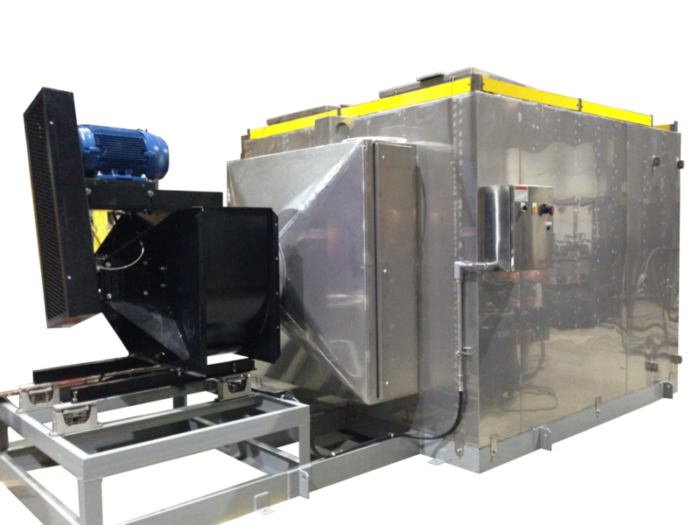
Air Scrubber
This skidded air scrubber unit features a powerful fan driven by a robust electric motor paired with a large fan, filters, and media bed to suck and scrub the contaminated air from the wastewater processing unit to control the smell. This unit is enclosed in a durable metal housing with an integrated control panel for precise operation and monitoring. The system is mounted on a sturdy skid for easy transport and installation. The system is ideal for heavy-duty industrial applications requiring controlled airflow, such as dust control, air quality management, or cooling processes.
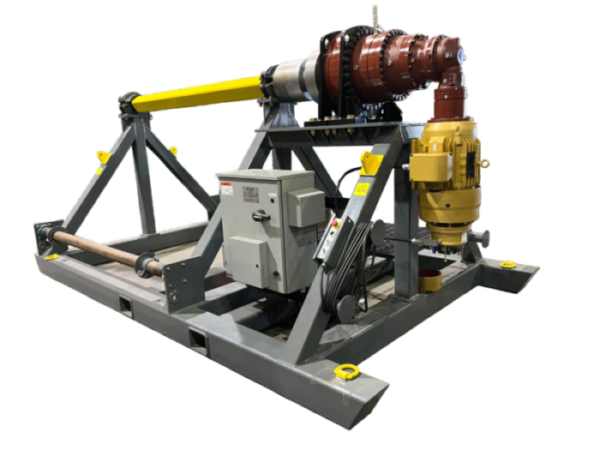
Belt Winder for Large Belts
This skidded unit is specialized equipment designed for heavy-duty mechanical tasks. The skid features a robust frame constructed from high-strength steel, painted gray for corrosion resistance and long-term durability. The central powertrain includes a powerful, industrial-grade gearbox and a high-capacity motor to deliver substantial torque for drilling or heavy mechanical lifting operations. The gearbox assembly, painted in a protective red coating, is linked to a yellow-tinted torque arm, providing stability and mechanical leverage. A high-efficiency motor, painted in yellow, powers the entire setup, ensuring reliable performance in high-demand environments.
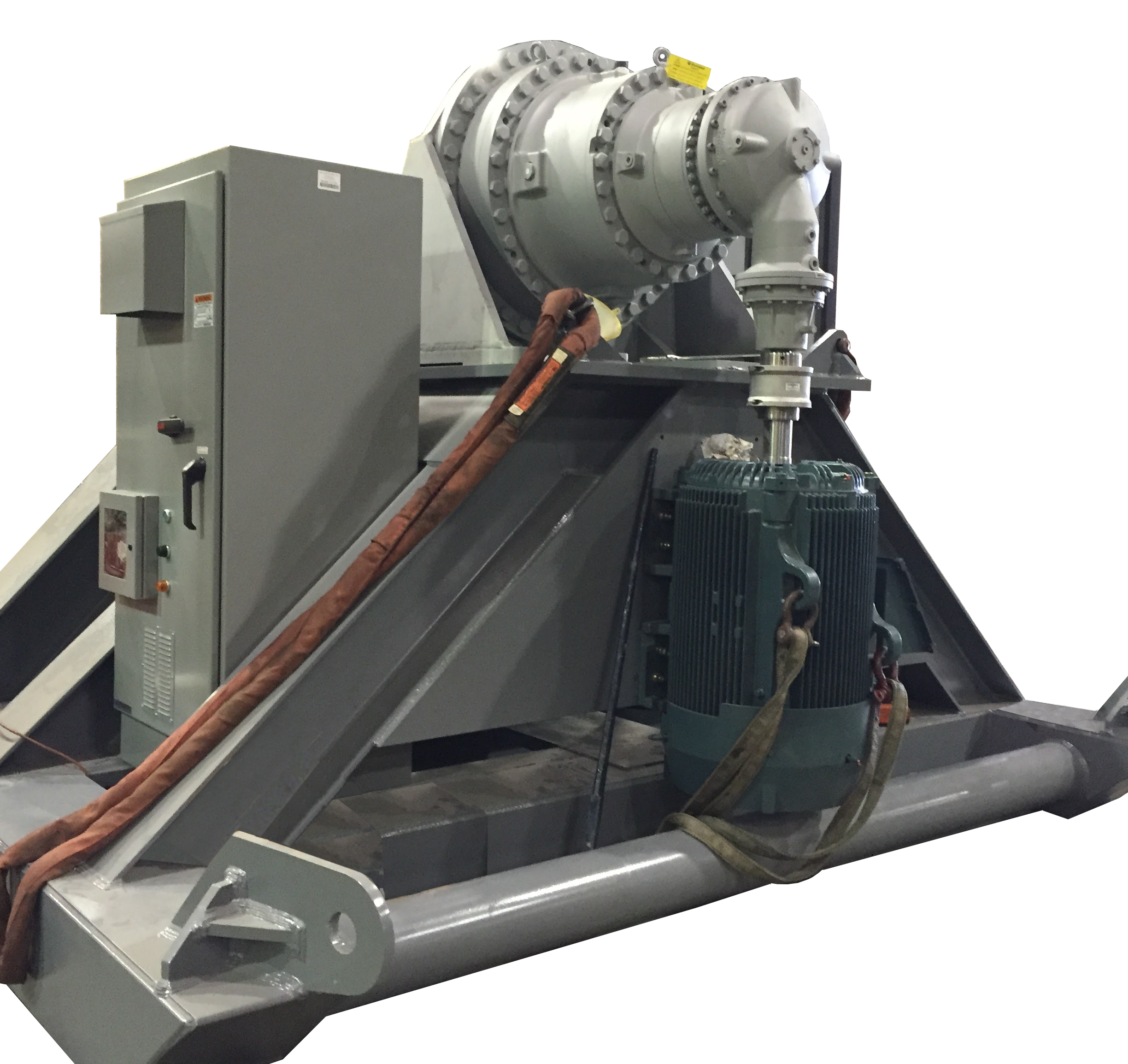
Geared Belt Winder
This is a heavy-duty belt winder equipped with a 75HP motor and a 100:2 ratio gearbox to produce tremendous torque to wind a heavy belt for repair purposes. The motor is driven by sophisticated control panels equipped with a main breaker, variable frequency controller, motor breaker power, and a remote pendant for operation. The VFD is programmed for a unique operation to maintain the linear speed of the belt while the reel diameter keeps changing. This skid is built for mining sites to wind and unwind the big conveyor belts for maintenance.
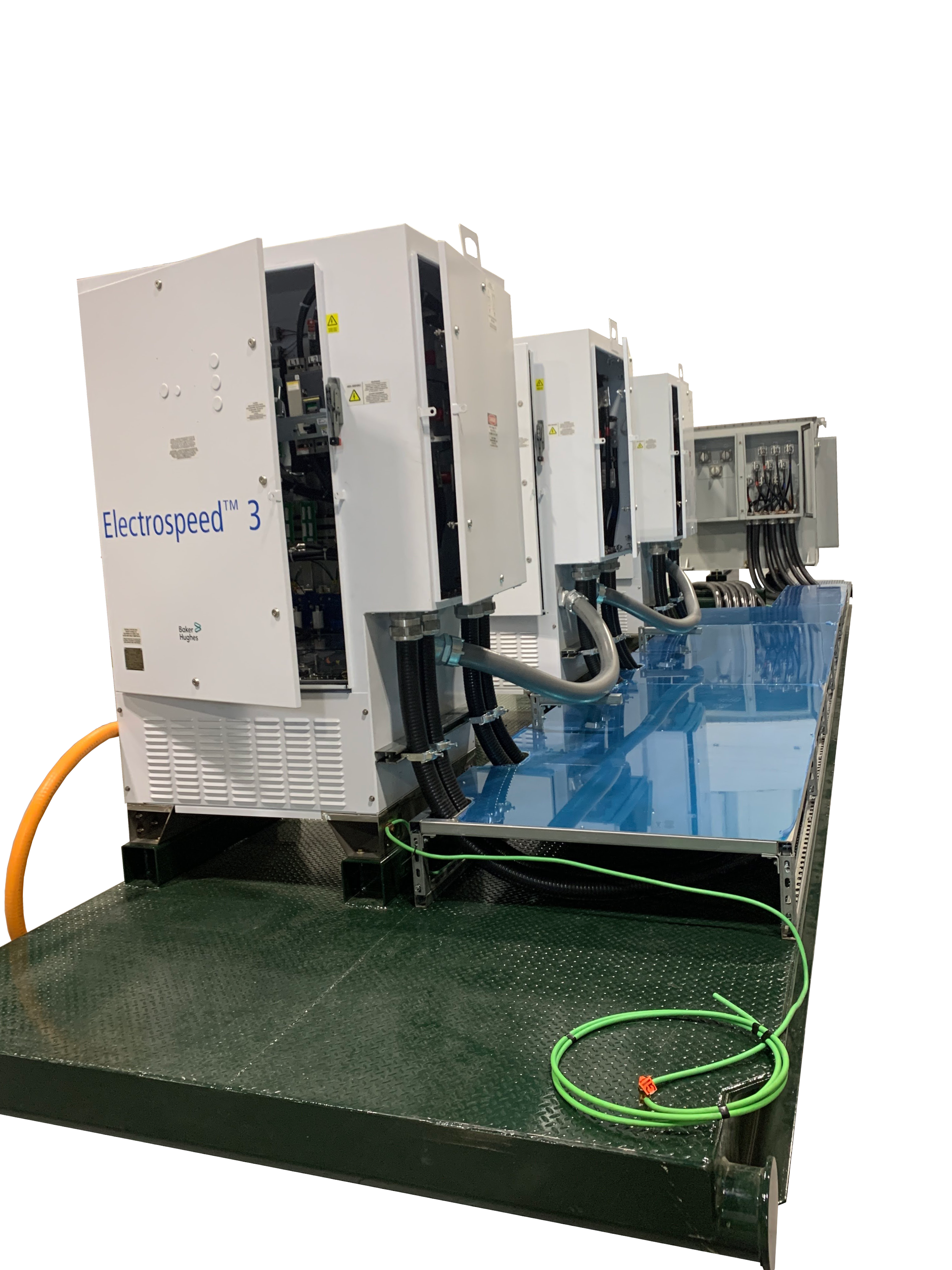
VFD Control for ESP Pumps
This large VFD skid system is built to run deep ESP pumps for geotherm applications. Three VFDs are paralleled to produce 2000 KWs of power to drive the pump. An 18-pulse transformer at the input helps reduce the harmonics produced by these large drives. The output is bumped up to 5 KV with a transformer to reduce the losses across the long cable going to underground electrical submersible pumps. Solution Controls installed all the equipment on the skid, including VFD and transformer. We also installed the raceways, cabling completed connections and provided a turn-key solution to the customer.
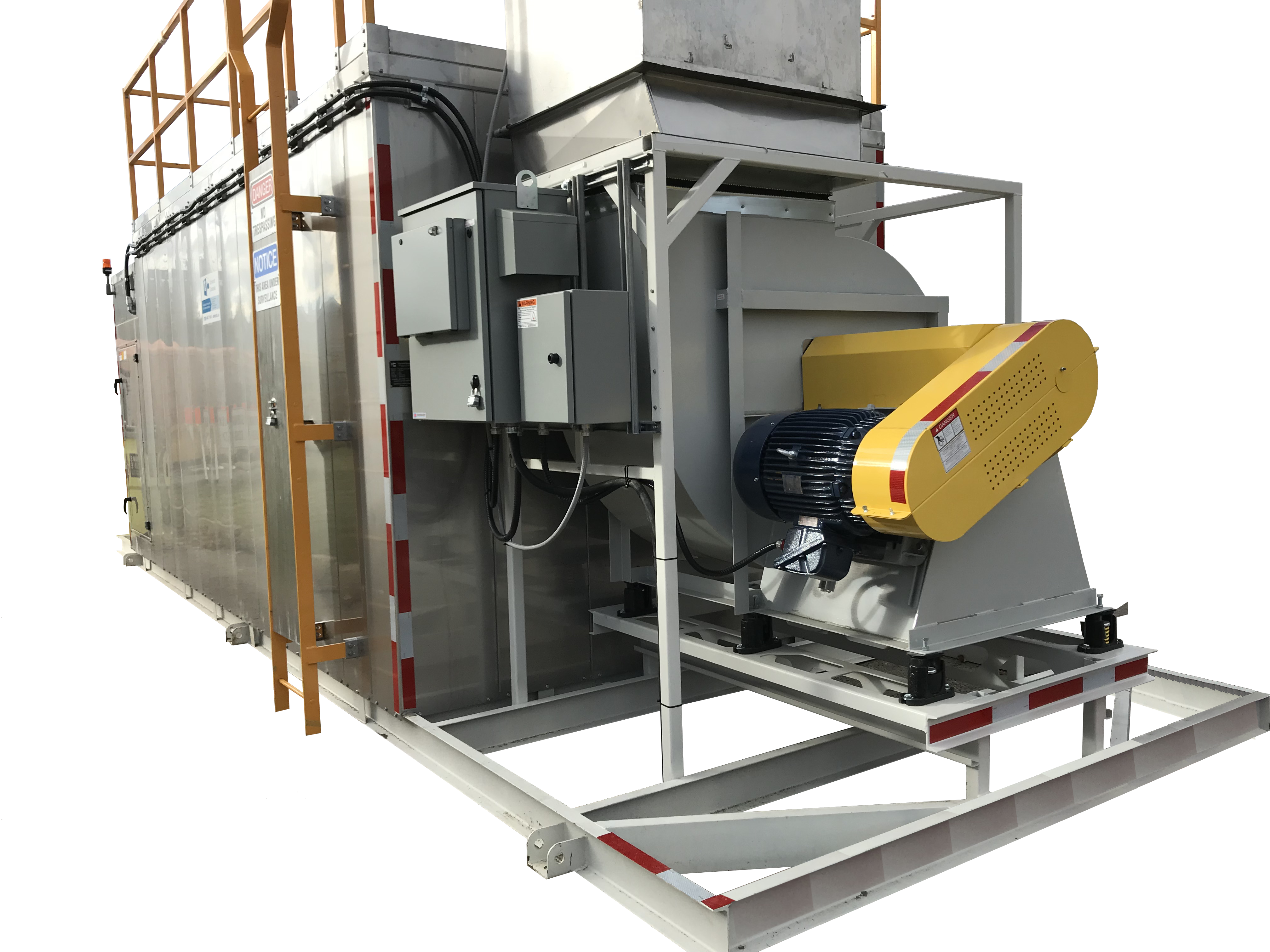
Large Ventilation Fan for Sewer System
This skid-mounted industrial ventilation system combines a high-power fan with an electric motor and a control panel built for the critical task of exhausting contaminated air from an underground sewer system and scrubbing it before dumping it into the neighbourhood to control the odour. The control panel was also equipped with LEL gas monitoring sensors to monitor the contaminated air.
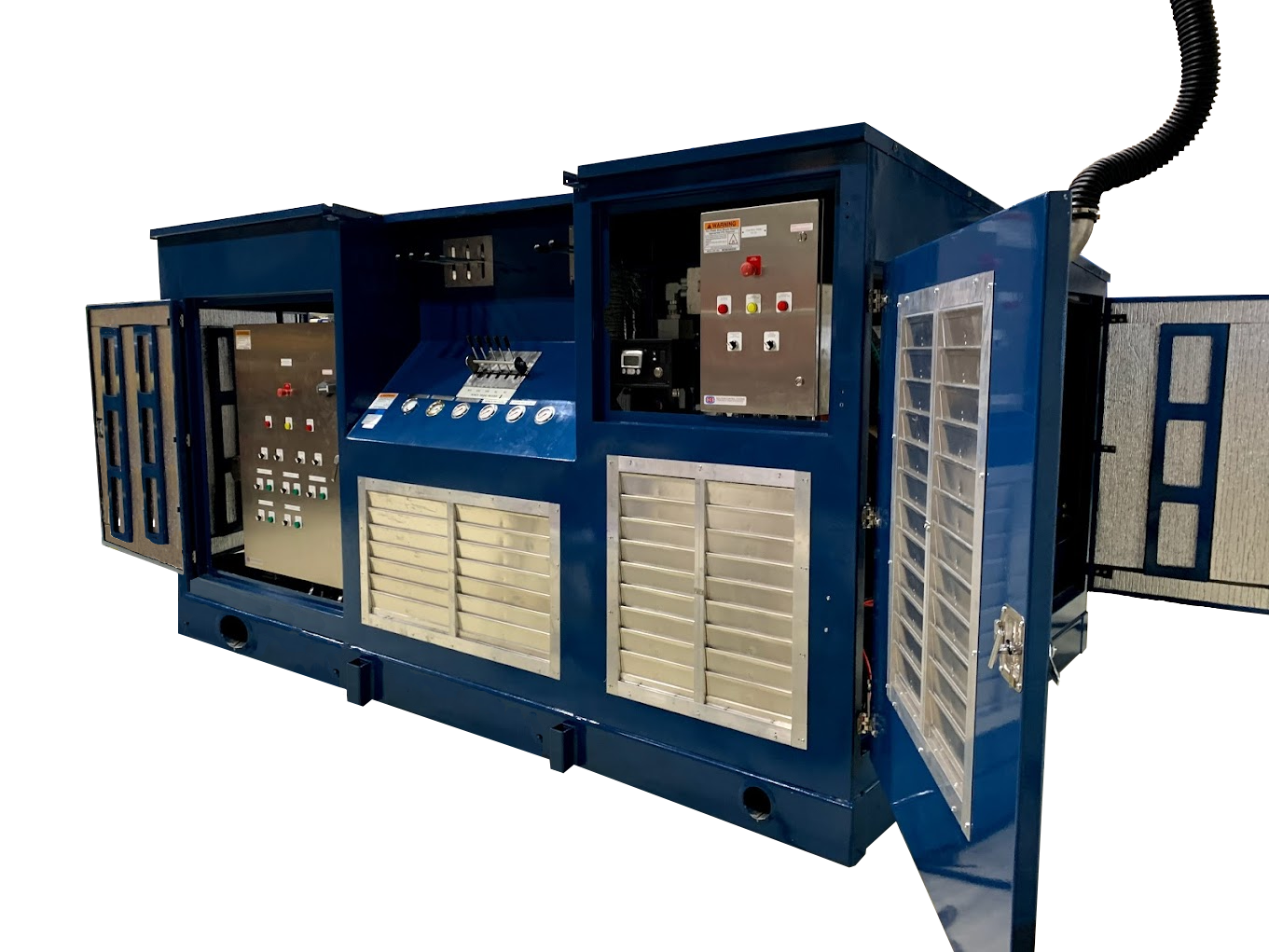
Dual Hydraulic Winch Power Unit
This enclosed dual-power hydraulic unit is equipped with a 200HP diesel engine and a 20HP electric motor to power hydraulic winches for lifting boats onto a barge in a pond. The smaller HP power-up with a motor provides limited power to winches to lower the barge boats to the pond. Solution Control Systems designed the control panels to power up the electric motor, radiator fans, power engine coolant circulating pump, block heater, and cold start package. We also designed the engine control panel and fabricated all the panels and wires to all the devices.
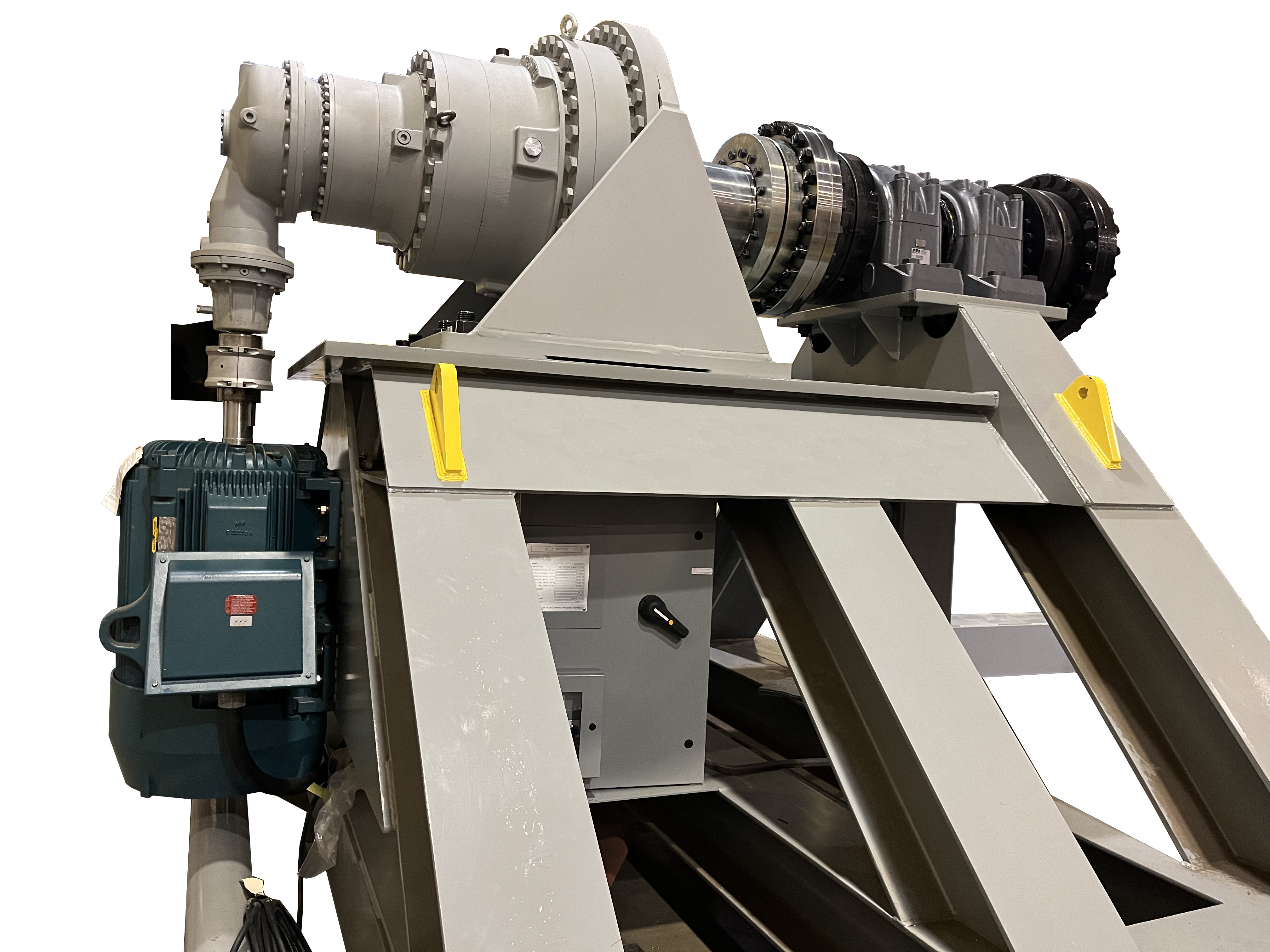
Large Belt Winder
This skid-mounted industrial ventilation system combines a high-power fan with an electric motor and a control panel built for the critical task of exhausting contaminated air from an underground sewer system and scrubbing it before dumping it into the neighbourhood to control the odour. The control panel was also equipped with LEL gas monitoring sensors to monitor the contaminated air.
What are Skids or Skidded Equipment Integration?
A Comprehensive Modular Solution
Skids or skidded equipment refers to modular, pre-assembled systems mounted on a framework or “skid” base, allowing easy transportation, setup, installation and maintenance. These units integrate components like control panels, piping, and electrical systems, creating a complete, portable solution. Skidded equipment is ideal for industrial applications, offering flexibility, quick deployment, and cost savings due to offsite assembly and streamlined on-site installation.
Why Choose Skidded Systems?
- Enhanced Flexibility and Scalability - Skidded equipment systems are inherently modular, enabling businesses to scale operations efficiently without significant capital expenditures on infrastructure changes. These systems allow for quick adjustments, whether an expansion of capacity or a complete reconfiguration, meeting current needs and future growth projections.
- Streamlined Installation Process - With pre-assembled skidded solutions, much of the construction occurs offsite, reducing the installation time required on location. This approach minimizes labour costs and reduces onsite disruption and the risks associated with traditional, extensive onsite construction.
- Increased Operational Efficiency and Safety - Skidded equipment is pre-tested and quality-assured before deployment, ensuring it meets stringent industry standards for performance and safety. This pre-commissioning step allows for faster start-up times, reduces the likelihood of technical issues, and guarantees that your operations will maintain high productivity from day one with minimal safety concerns.
- Cost-Effective and Space-Saving - Compared to traditional equipment setups, skidded systems are more compact and can be engineered to optimize space usage. This is a significant advantage for facilities with limited space, as it allows for efficient use of space without compromising operational capacity. Additionally, the modular nature of skidded units reduces capital expenditure by minimizing onsite construction requirements and facilitating easy relocations or upgrades.
Components of Skidded Equipment Systems
Skidded equipment systems have various integrated components, each chosen to meet specific operational requirements. Some key components include:
- Structural frame (skid base) - The skid base serves as the foundation, supporting all components and ensuring stability during transport and installation. The frame is made from durable materials like steel and provides a robust platform for securing equipment, piping, and other essential parts.
- Piping and Valves - Essential for fluid and gas transport, skidded systems often include interconnected piping with valves for flow control, pressure management, and process isolation. These components are typically configured to industry standards for safely handling different chemicals or fluids.
- Pumps and Compressors - are essential for moving fluids or gases through the system. Various types, like centrifugal or positive displacement pumps, are chosen based on the application, ensuring consistent pressure, flow rate, and performance.
- Control Panels - house the electrical and control systems that allow operators to manage and monitor the skidded equipment. This component often includes PLCs (Programmable Logic Controllers), circuit breakers, switches, and user interfaces for seamless operation.
- Instrumentation and Sensors - Skidded systems incorporate sensors for measuring critical parameters like pressure, temperature, and flow rate. These sensors feed data to control systems, enabling real-time monitoring and automated adjustments for optimal performance and safety.
- Electrical Components and Wiring - Electrical wiring connects the components, while transformers, switchgear, and circuit breakers ensure proper power distribution within the skid. These components are critical for maintaining safe and efficient operation, especially in electrically demanding environments.
- Filtration Systems - In systems handling fluids or gases, filtration components help remove impurities and protect downstream equipment. Filters and separators maintain process integrity, improve equipment lifespan, and ensure product quality.
- Heat Exchangers - Heat exchangers regulate the temperature of fluids within the skid and are used in temperature-sensitive applications. They can be essential for maintaining operational stability in chemical processing, HVAC, or oil and gas applications.
- Chemical Dosing Equipment - Skidded systems may include pumps, tanks, and injection nozzles for applications requiring precise chemical dosing. These components enable accurate chemical addition to processes like water treatment, reducing the risk of overusing or underusing chemicals.
- Safety Systems and Emergency Shutoffs - Skidded equipment often includes emergency shutdown systems and safety features, such as relief valves, fire suppression systems, and emergency stop buttons, to ensure safe operation in hazardous environments.
Our Comprehensive Skidded Equipment Services
- Custom Engineering and Design Solutions - Our engineering team works closely with clients to design skidded equipment packages tailored to each operation’s unique requirements. We account for all relevant factors, including spatial constraints, environmental conditions, and seamless integration with existing systems. Each design undergoes a rigorous review, ensuring functionality, durability, and adaptability.
- Turnkey Electrical, Instrumentation, and Control Integration - Solution Control Systems specializes in comprehensive electrical and control system integration within skidded equipment. From electrical cabling and switchgear integration to advanced instrumentation, our team ensures that each package functions autonomously or as part of a larger system. Safety and operational standards are central to every solution we design, giving you peace of mind about the reliability and compliance of each installation.
- End-to-End Project Management - Our project management team oversees each step of the skidded equipment integration process, from conceptualization to commissioning. By handling design, fabrication, testing, logistics, and final installation, we offer a seamless and efficient experience. Our end-to-end support ensures projects are delivered on time and within budget, eliminating common challenges and delays and giving you peace of mind about the timely delivery of your project.
- Quality Assurance and Testing Protocols - Before leaving our facility, each skidded unit undergoes extensive and thorough testing to ensure it performs reliably and safely. Our quality assurance team employs rigorous testing protocols, checking all components for compliance with industry standards. This commitment to quality reduces the risk of onsite issues and provides a reliable, fully functional system ready for immediate operation, giving you confidence in the performance of our product.
Critical Advantages of Skidded Equipment Integration
- Speed of Deployment—Since skidded systems are prefabricated and pre-tested, they offer unparalleled speed of deployment. Businesses can see a faster return on investment with minimal lead times, ensuring operational capabilities are achieved sooner than with traditional, site-built equipment.
- Adaptability to Changing Regulations and Standards - Our skidded solutions are designed with flexibility in mind, allowing easy compliance with evolving industry regulations. Their modular design enables straightforward upgrades and modifications to meet changing environmental and safety standards without significant overhauls.
- Reduced Downtime for Maintenance and Repair - The modular setup makes maintenance and repairs significantly easier and faster with skidded equipment. Each unit can be isolated, inspected, and repaired with minimal impact on other processes, ensuring downtime is minimized and productivity remains high.
Benefits of Skidded Equipment Integration
- Time Savings and Efficiency - Since skidded units are assembled offsite, the time required for on-site setup is drastically reduced. This process minimizes labour needs and accelerates project timelines, enabling faster deployment and operational readiness.
- Reduced Operational Costs - By prefabricating skidded equipment, the integration process requires fewer resources, lower labour costs, and less downtime, leading to substantial cost savings. This efficient setup also reduces the need for lengthy on-site installations and potential disruptions to existing operations.
- Quality Control and Safety - Skidded systems are subjected to rigorous testing and quality control before they reach the client’s site. This pre-testing is a crucial step that ensures all components meet industry standards for safety and reliability, thereby building trust in the performance of skidded units and reducing the likelihood of technical issues.
Types of Skidded Equipment Integration
Pump Skids
Pump skids manage and transport fluids in water treatment, chemical processing, and oil and gas industries. These skidded systems include integrated piping, pumps, and control panels for streamlined fluid handling.
Electrical and Power Skids
Electrical skids include transformers, switchgear, and control systems for efficient power distribution and management. These units are ideal for power generation facilities and industrial sites needing a compact, fully integrated power solution.
Chemical Processing Skids
Ideal for industries like pharmaceuticals and chemicals, these skidded systems provide complete setups for mixing, filtering, and processing various chemicals. They comply with industry standards and are designed to handle hazardous materials safely.
Skidded Equipment Integration Process
Step 1: Initial Consultation and Design
Each project begins with a detailed consultation to understand the client’s operational requirements. Our engineering team collaborates closely with clients to develop a custom solution, considering factors like space, functionality, and environmental conditions.
Step 2: Fabrication and Assembly
Once the design is finalized, the skidded equipment is fabricated and assembled in our facility. Our team handles the installation of all necessary components, such as electrical wiring, piping, and instrumentation, to ensure that each unit is ready for immediate deployment.
Step 3: Testing and Quality Assurance
Every skidded system undergoes thorough testing, including functionality, durability, and safety checks. This quality assurance process ensures that the equipment meets industry standards and specific project requirements before being shipped to the site.
Step 4: Onsite Delivery and Commissioning
Once tested, the skidded equipment is transported to the client’s site, positioned, connected, and commissioned. Our team ensures a smooth handover, providing any necessary guidance to operators for seamless integration into existing processes.
Environmental and Safety Considerations
Eco-Friendly and Sustainable Design - Our skidded equipment solutions are designed with environmental sustainability in mind. The modular nature of skidded units often reduces material waste and minimizes environmental impact, contributing to eco-friendly operations.
Compliance with Safety Regulations - We adhere to stringent industry standards for safety and compliance in all our skidded equipment solutions. From robust safety features to comprehensive testing, each unit is designed to meet or exceed regulatory requirements, ensuring a safe working environment.
